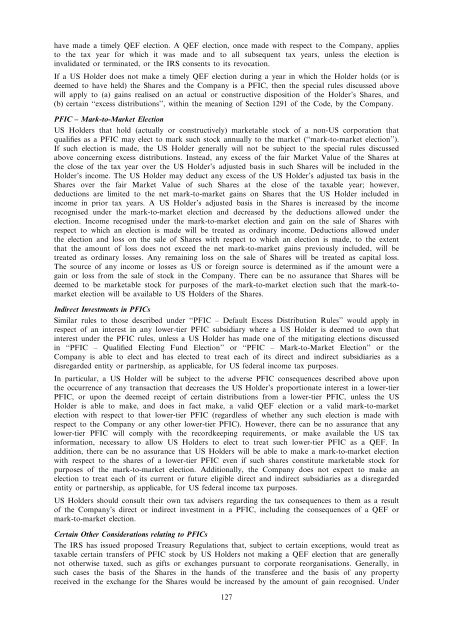You also want an ePaper? Increase the reach of your titles
YUMPU automatically turns print PDFs into web optimized ePapers that Google loves.
have made a timely QEF election. A QEF election, once made with respect to the Company, applies<br />
to the tax year for which it was made and to all subsequent tax years, unless the election is<br />
invalidated or terminated, or the IRS consents to its revocation.<br />
If a US Holder does not make a timely QEF election during a year in which the Holder holds (or is<br />
deemed to have held) the Shares and the Company is a PFIC, then the special rules discussed above<br />
will apply to (a) gains realised on an actual or constructive disposition of the Holder’s Shares, and<br />
(b) certain ‘‘excess distributions’’, within the meaning of Section 1291 of the Code, by the Company.<br />
PFIC – Mark-to-Market Election<br />
US Holders that hold (actually or constructively) marketable stock of a non-US corporation that<br />
qualifies as a PFIC may elect to mark such stock annually to the market (‘‘mark-to-market election’’).<br />
If such election is made, the US Holder generally will not be subject to the special rules discussed<br />
above concerning excess distributions. Instead, any excess of the fair Market Value of the Shares at<br />
the close of the tax year over the US Holder’s adjusted basis in such Shares will be included in the<br />
Holder’s income. The US Holder may deduct any excess of the US Holder’s adjusted tax basis in the<br />
Shares over the fair Market Value of such Shares at the close of the taxable year; however,<br />
deductions are limited to the net mark-to-market gains on Shares that the US Holder included in<br />
income in prior tax years. A US Holder’s adjusted basis in the Shares is increased by the income<br />
recognised under the mark-to-market election and decreased by the deductions allowed under the<br />
election. Income recognised under the mark-to-market election and gain on the sale of Shares with<br />
respect to which an election is made will be treated as ordinary income. Deductions allowed under<br />
the election and loss on the sale of Shares with respect to which an election is made, to the extent<br />
that the amount of loss does not exceed the net mark-to-market gains previously included, will be<br />
treated as ordinary losses. Any remaining loss on the sale of Shares will be treated as capital loss.<br />
The source of any income or losses as US or foreign source is determined as if the amount were a<br />
gain or loss from the sale of stock in the Company. There can be no assurance that Shares will be<br />
deemed to be marketable stock for purposes of the mark-to-market election such that the mark-tomarket<br />
election will be available to US Holders of the Shares.<br />
Indirect Investments in PFICs<br />
Similar rules to those described under ‘‘PFIC – Default Excess Distribution Rules’’ would apply in<br />
respect of an interest in any lower-tier PFIC subsidiary where a US Holder is deemed to own that<br />
interest under the PFIC rules, unless a US Holder has made one of the mitigating elections discussed<br />
in ‘‘PFIC – Qualified Electing Fund Election’’ or ‘‘PFIC – Mark-to-Market Election’’ or the<br />
Company is able to elect and has elected to treat each of its direct and indirect subsidiaries as a<br />
disregarded entity or partnership, as applicable, for US federal income tax purposes.<br />
In particular, a US Holder will be subject to the adverse PFIC consequences described above upon<br />
the occurrence of any transaction that decreases the US Holder’s proportionate interest in a lower-tier<br />
PFIC, or upon the deemed receipt of certain distributions from a lower-tier PFIC, unless the US<br />
Holder is able to make, and does in fact make, a valid QEF election or a valid mark-to-market<br />
election with respect to that lower-tier PFIC (regardless of whether any such election is made with<br />
respect to the Company or any other lower-tier PFIC). However, there can be no assurance that any<br />
lower-tier PFIC will comply with the recordkeeping requirements, or make available the US tax<br />
information, necessary to allow US Holders to elect to treat such lower-tier PFIC as a QEF. In<br />
addition, there can be no assurance that US Holders will be able to make a mark-to-market election<br />
with respect to the shares of a lower-tier PFIC even if such shares constitute marketable stock for<br />
purposes of the mark-to-market election. Additionally, the Company does not expect to make an<br />
election to treat each of its current or future eligible direct and indirect subsidiaries as a disregarded<br />
entity or partnership, as applicable, for US federal income tax purposes.<br />
US Holders should consult their own tax advisers regarding the tax consequences to them as a result<br />
of the Company’s direct or indirect investment in a PFIC, including the consequences of a QEF or<br />
mark-to-market election.<br />
Certain Other Considerations relating to PFICs<br />
The IRS has issued proposed Treasury Regulations that, subject to certain exceptions, would treat as<br />
taxable certain transfers of PFIC stock by US Holders not making a QEF election that are generally<br />
not otherwise taxed, such as gifts or exchanges pursuant to corporate reorganisations. Generally, in<br />
such cases the basis of the Shares in the hands of the transferee and the basis of any property<br />
received in the exchange for the Shares would be increased by the amount of gain recognised. Under<br />
127


